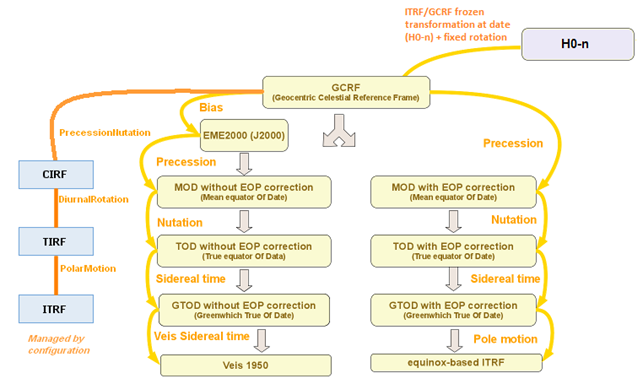Earth Features : Différence entre versions
| Ligne 1 : | Ligne 1 : | ||
Frames configuration is, by default, relatively simple as it has been considered the best ratio between precision and <font color=#FF8C00>CPU</font> time. Anyway, it is possible to make it more complex. Nevertheless, be careful about the <font color=#FF8C00>EOP</font> corrections as it needs some data provided by [[https://logiciels.cnes.fr/en/node/64?type=desc PATRIUS_DATASET]] (included in the jar). So, if the data for a given epoch are not available, the propagation will exit with an error status. | Frames configuration is, by default, relatively simple as it has been considered the best ratio between precision and <font color=#FF8C00>CPU</font> time. Anyway, it is possible to make it more complex. Nevertheless, be careful about the <font color=#FF8C00>EOP</font> corrections as it needs some data provided by [[https://logiciels.cnes.fr/en/node/64?type=desc PATRIUS_DATASET]] (included in the jar). So, if the data for a given epoch are not available, the propagation will exit with an error status. | ||
| − | <font color=#FF0000>Note : in V11.0, by default configuration is the complex (factory) one.</font> | + | ''<font color=#FF0000>Note : in V11.0, by default configuration is the complex (factory) one.</font>'' |
The following diagram explains the links between all considered frames. | The following diagram explains the links between all considered frames. | ||
| Ligne 8 : | Ligne 8 : | ||
In the table below, we can see an example of precision versus <font color=#FF8C00>CPU</font> time depending on the frames configuration and for a 30 days LEO propagation: | In the table below, we can see an example of precision versus <font color=#FF8C00>CPU</font> time depending on the frames configuration and for a 30 days LEO propagation: | ||
| − | Case Corrections Max position error (m) Max velocity error (m/s) CPU time (s) | + | |
| + | {| class="wikitable" | ||
| + | |- | ||
| + | |Case | ||
| + | |Corrections | ||
| + | |Max position error (m) | ||
| + | |Max velocity error (m/s)| | ||
| + | |CPU time (s) | ||
| + | |- | ||
| + | |1 | ||
| + | |All (IERS2010)| | ||
| + | -| | ||
| + | -| | ||
| + | 4.24 | ||
| + | |} | ||
| + | |||
1 All (IERS2010) - - 4.24 | 1 All (IERS2010) - - 4.24 | ||
2 All except EOPs 14.6 1.68E-02 4.02 | 2 All except EOPs 14.6 1.68E-02 4.02 | ||
3 Only Precession-Nutation 14.6 1.68E-02 2.88 | 3 Only Precession-Nutation 14.6 1.68E-02 2.88 | ||
4 No corrections 469 5.42E-01 1.97 | 4 No corrections 469 5.42E-01 1.97 | ||
Version du 6 juillet 2017 à 14:09
Frames configuration is, by default, relatively simple as it has been considered the best ratio between precision and CPU time. Anyway, it is possible to make it more complex. Nevertheless, be careful about the EOP corrections as it needs some data provided by [PATRIUS_DATASET] (included in the jar). So, if the data for a given epoch are not available, the propagation will exit with an error status.
Note : in V11.0, by default configuration is the complex (factory) one.
The following diagram explains the links between all considered frames.
In the table below, we can see an example of precision versus CPU time depending on the frames configuration and for a 30 days LEO propagation:
| Case | Corrections | Max position error (m) | CPU time (s) | |
| 1 |
-| -| 4.24 |
1 All (IERS2010) - - 4.24 2 All except EOPs 14.6 1.68E-02 4.02 3 Only Precession-Nutation 14.6 1.68E-02 2.88 4 No corrections 469 5.42E-01 1.97
